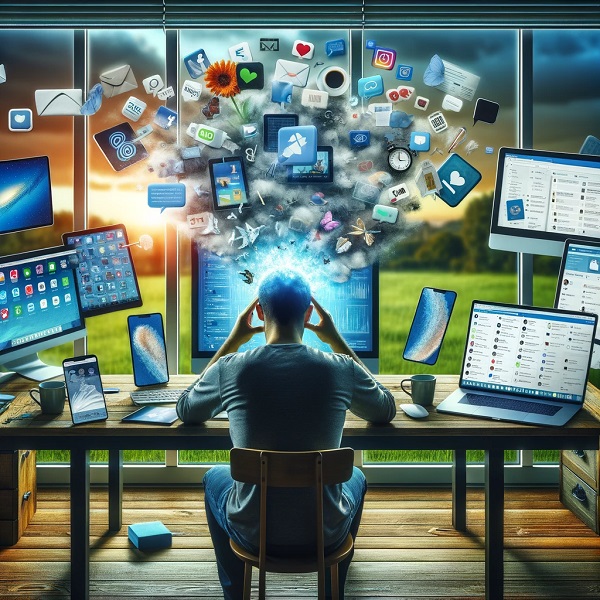
Mental Health in the Digital Age
Gersom
- 0
Introduction
The Rise of Digital Technology
We live in an age of smartphones and tablets, laptops and netbooks. It is an age that pulsates with digital information, yet how does this information age impact on our mental well-being? Technology is a killer and it is a savior.
Changing Social Dynamics
Given the migration of dating to the internet and our transition to staring at screens – rather than one another’s eyes – face-to-face, do friends when we can also chat via video call? Tap, tap – chosen over chirp, chirp? It’s easier, but is it really the same? Let’s examine the impact of these social shifts on our mental wellbeing.
The Impact of Social Media
The Comparison Trap
Taking a look at Instagram can make you seriously depressed. Everyone is on vacation somewhere exotic; everyone is eating at fancy restaurants; everyone has a picture-perfect family and life. You begin to compare your life with theirs, to check-in and find out that you’re not so good. But wait a minute! You are just looking at the best pictures they are choosing to publish; you don’t know the real story.
Cyberbullying and Its Effects
The internet can at times also be a nasty place. Cyberbullying is a real threat, especially among younger people. The cloak of the website’s anonymity encourages the worst behavior in many people, causing serious emotional distress to the recipients.
The Echo Chamber Phenomenon
Have you ever enjoyed how your Facebook or Twitter feed agrees with almost everything you believe? Welcome to the echo chamber, part of the re-enforcement of our own beliefs that can cause us to perceive or create a version of reality around us lacking in much diversity, and more difficult to leverage for public dialogues that could enrich the broader set of beliefs.
Screen Time and Mental Well-being
The Addiction to Screens
Be honest – how many hours of the day do you spend looking at a screen? Be it work, entertainment or socializing, this time minimum increases. And the result? Digital addiction – it becomes nearly impossible to take a break.
Sleep Disruptions
Last thing in bed? You’re doing it wrong. Your phone is the last thing you see before you sleep – but its damaging blue light can make it harder to nod off, and harder to get a good night’s rest.
Eye Strain and Physical Discomfort
Have you ever felt any pain in your head after working for hours in front of your computer? Probably you did. It is called digital eye strain. Aside from that, you are certainly aware that sitting for six to eight hours while working at your office can adversely affect your body. From physical discomfort to long-term health problems, every form of sitting, whether it is work-related or not, becomes a strain for your body and mind. You might be thinking about how you can easily get rid of these problems, right? Thus, here I would like to give you a solution.
Digital Detox and Mindfulness
The Benefits of Unplugging
A digital detox remains a break from the modern world. The result? You emerge a happier human being, rebooted after a hit from Ma Nature.
Practicing Mindfulness in a Digital World
The first step is mindfulness: be there in the moment. That’s easier said than done, with all the everyday distractions. But there are techniques that can help, including meditation, deep breathing, and perhaps even mindful scrolling.
The Role of Technology in Mental Health Care
Teletherapy and Online Counseling
It’s not that all tech is harmful to mental health. Online counseling and teletherapy have made mental health treatment available to more people by connecting them to therapists through their laptop or phone. Going to therapy no longer means having to take time off work and travel to someone else’s office. You can get help from the comfort of your home.
Mental Health Apps and Tools
For everything, including mental health, there’s an app. Meditation. Mood tracking. CBT. Mental health apps can be powerful tools.
Strategies for Maintaining Mental Health
Setting Boundaries with Technology
Just block/cut off the boundaries and believe in it. Specifically, he advises establishing limits on exposure to screens, confining them to a specific part of their home (no technology in their bedrooms), spending less time on devices, and adhering to a device usage schedule. In other words, it is possible to cultivate a healthy relationship with technology.
Building Healthy Online Habits
Be careful what you post online, follow those who lift you up, type those nice comments and don’t be shy to hit unfollow on anything that doesn’t serve you well.
Seeking Professional Help When Needed
The message remains clear: Nothing is shameful about asking for support. If you need help, don’t wait; see a professional today. In-person audiences benefitted from attending a mental health awareness talk while experiencing an immersive theatrical performance that encouraged them to form positive associations with mental health. Individuals interacting with the chatbot received mental health education and had the opportunity to privately ask for help if needed. Both groups left knowing that mental health is important and, like with physical health, there is no shame in getting help.
Conclusion
We need to recognize that technology is here to stay and that we should find ways to achieve this balance and live unclouded lives. Knowing that digital technology can affect our mental health, and modifying and utilizing it in a mindful way can maximize the benefits of technology. So take a deep breath. It’s all about balance.
FAQs
How does social media affect mental health?
Social media activates a fear of missing out, often causing unhappiness when comparing our lives to the seemingly better lives of others. Social media also increases the risk of cyberbullying, which is known to damage mental health.
What is digital detox, and why is it important?
A digital detox usually happens when you take a short break from digital devices to reduce your stress and to get back to the real world. Obviously, it is important from mental health perspective. To begin with, it helps you eliminate screen addiction to relieve mental pressure.
Can technology be beneficial for mental health?
Yes technology can be helpful. you can get teletherapy, online conversation based counselling and mental health apps are useful resources for mental heath support and care.
What are some tips for managing screen time?
Put limits on screen time, establish tech-free zones, take break often, and be mindful to smartphone use.
How can I practice mindfulness in a digital world?
You can practice mindfulness by meditating at home, taking deep breaths on your ride (or walk) home from work – mindful scrolling online, or being mindful in how you practice your sport, or interact face-to-face with others.
iPhone 12 Pro Max LG Velvet LG Velvet LG K40 iPhone XR Samsung Note 20 Samsung Note 20 LG V60 ThinQ LG K40 Samsung Note 20


